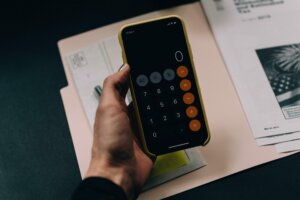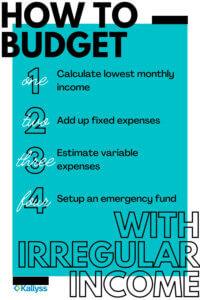
In freelance, independent, contract, student or commission-based jobs, you may not make the same amount of money every month. This may also be the case if you are not in steady employment.
Many people in these circumstances find themselves looking for loans each month to get through what may otherwise be difficult times each month. For some people, they may only need a $500 loan whereas others may need a little more and may look to borrow $1000 or a little more.
You may work part time at different roles, taking on more hours depending on the week, or have a set salary with the ability to get commission on the side. In whatever way you work, you may have an irregular income; don’t worry you aren’t alone.
It can seem quite scary, not knowing exactly how much money you have to live on each month. You may have set bills or commitments that require pre-planning and budgeting, and without a certainty on your monthly income, it will be a challenge.
But it doesn’t need to be.
You can, and should, be able to budget on an irregular income. But where to start?
Calculate Your Lowest Monthly Income
When budgeting for an irregular income, it’s important to consider the month ahead as if you are only going to make the bare minimum of your average income. In this way, if the month is not so lucrative, there is no panic or worry that you cannot afford to live day to day.
The easiest way to work this out is to look at the money you know for certainty entering your account in the coming month and budgeting as if no other money exists. If your job roles don’t afford you a set minimum per month, look at the lowest income you had previously made in a month and start from that figure.
This is your initial sum, even if you think there is a likely chance you will earn more in the coming month, but it is not certain, leave it for the moment and start with the smaller amount.
Add Up Fixed Expenses
Once you have calculated your lowest monthly income, it’s time to add up your fixed expenses. Fixed expenses are those that vary little, if at all, month to month and are essential for you to live before you borrow money or have to make any adjustments. They can include:
- Rent, mortgage payments or subletting
- Utility bills, such as water, gas and electric bills
- WIFI and broadband bills
- Car insurance, gas or payments
- Loan repayments (for example, online payday loans and installment loans you may have borrowed)
- Groceries
- Work travel
Any personal monthly costs, such as medical bills, essential appointments or health required services
The easiest way to work these costs out is to compare your previous month’s credit or debit card bills and make note of the fixed costs. It could help to separate your fixed costs into different categories and make a note at what point of the month each bill or payment leaves your account.
Also consider variations in bills, for example, gas and electric may be higher in the winter, and keep note of irregular fixed costs, such as yearly expenses. If one bill has to be paid once a year, work out that cost and divide it by twelve to estimate how much you should put aside each month to add up to the final cost.
Once you have found all your fixed expenses, add them up to a total.
Estimate Your Variable Expenses
Next, it’s time to estimate your variable costs, these are costs that do change, often intensely, each month. They are items and services that you want to have the ability to do in the coming month, but if all else fails, it is not essential to have in your day to day. They can include:
- Clothing
- Restaurants
- Shows, theatre and entertainment
- Travel
- Subscriptions to streaming services, newspapers, meal deliveries, gym memberships
- Beauty treatments
- Any extras you might want in the month ahead
It’s okay to have these variables and extra costs in your budget, you want to enjoy life and be able to spend the money you worked hard earning, on yourself. But it’s key to be honest, as much as you would love to be able to put $200 towards eating out this month, your pay check may not allow this. Be truthful with yourself about what you can afford and what expenses you can let go of.
Set Up An Emergency Fund
Life is unpredictable, so it’s important to be prepared for those moments. A key aspect of budgeting on an irregular salary is setting up an emergency fund. This is a set amount of money you are not allowed to touch unless absolutely necessary and which can help you avoid needing emergency loans when a financial emergency does occur.
This could come in the form of an unexpected medical bill or a last-minute flight you have no choice in taking. It may be that you are let go from your one dependable job and need money to pay the bills. For whatever reason, having an emergency fund may save you a lot of stress down the line.
It’s up to you how much you want to and can afford to put into your emergency fund. If you are able, you may want a fund sufficient for 12 months of expenses. Whatever sum you can afford and will give you some piece of mind, make sure your fund is safe.

Subtract Fixed and Variable Expenses From Your Lowest Monthly Income
Now that your emergency fund is secure, and you have your two set expenses, its time to add together your fixed and variable expenses and subtract them from your estimated lowest monthly salary.
Hopefully you will still have some money left over to keep as a backup throughout the month. However, if you find that the amount is negative, you may have to go back to your variable expenses and reconsider some costs. You will need to decrease your variable expenses from whichever categories you choose until your total amount of money, once your expenses are subtracted from your income, are positive.
There are lots of ways to decrease your variable expenses. You may choose to completely scrap one of your categories that isn’t so important to you. However, many of the categories can be reduced instead of discarded.
Instead of budgeting for theatre or shows, look for free shows near you and reduce the price to just the travel cost. You can thrift clothes instead of buying new to save money or look into shared subscriptions to streaming services instead of paying for one by yourself.
By the end of this step, you should have a zero or positive sum of money left over.
Begin The Month and Track Everything
Finally, we begin our month. The most important step by far, that makes everything worth it, is to keep track of everything gained and spent in the month. Whether you use a budgeting app or keep a paper record, make sure to record every income or expense down to the cent.
Keep comparing your monthly budget to your day to day living and make sure to be honest in what you have spent. The only person who is disadvantaged from you not writing down the real amount from your dinner date is you.
Adjust Spending and Expenses As You Go
It may be the case that you made far more money than you expected throughout the month, that’s great! Allow that money to be added to your variable expenses or savings or emergency fund, whichever you would like.
The key to budgeting irregular income is allowing yourself to be flexible. It may be the case that you really want to use the extra money on an adventure or beauty treatment, that’s fine, but be sure to check your emergency fund or look at your saving goals before you splash out.
Likewise, it may be the case that one of your fixed amounts drastically changes for the worst or better. Allow any money saved to be moved across to whichever expense or savings you choose, but likewise, be open to moving some money from your variables over to fixed.
Remember, that if you are not responsible when it comes to budgeting and spending, you may find yourself needing to borrow money, which, if not managed properly can lead you to having very bad credit and requiring help to get out of difficult financial situations.
Create a New Budget As Each Month Begins
The last step is as you expected – repeat!
At the end of the month it’s time to look at the money you saved, maybe add it to your emergency or saving account or put it towards something special for the next month.
Then begin the process again, calculate your minimum income, fixed and variable costs, and create a new budget, now with the knowledge of your previous month.
Look back at your month of spending and ask:
- What did you do well?
- What do you spend far too much money on?
- Is your emergency fund sufficient?
- Do you have any new saving goals for the long term or for the months ahead?
Budgeting may seem like a hassle, especially when your income is not set, but by taking control of your expenses, you are ensuring you can not only live comfortably with the money you earn but allow yourself to enjoy life and the small things you want to afford that make it worth living.


